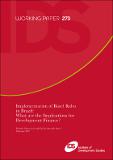Implementation of Basel rules in Brazil : what are the implications for development finance?

Download
Date
2007Author
Gottschalk, Ricardo
Sodré, Cecilia Azevedo
Metadata
Show full item recordImpact
Abstract
This paper is set to examine the developmental impact of international Codes
and Standards (C&S) as they are applied to the banking system in Brazil. It is
driven by the questions: to what extent has compliance with international C&S
affected, or may affect in the future, credit to the SMEs and the poor? Through
what mechanisms? What changes (institutional, other) have occurred as a
result? The paper focuses on the implementation of the Basel rules – Basel I
and II. It finds strong indications that, as a result of implementation of Basel I in
Brazil, credit as a proportion of the country’s GDP declined gradually between
1994 (when Basel I was adopted) and early this century. The paper also argues
that Basel I probably contributed to the decline in the number of banks in Brazil
since 1994, and to banking concentration as well. Furthermore, the paper shows
that although Basel I has affected credit in Brazil, there is no clear evidence that
credit to the SMEs, to rural producers or to the urban poor was negatively
affected, at least not in a major way. The paper suggests that a main reason for
this outcome is that credit patterns during the period under Basel I have been
influenced by directed credit policy, which in a number of cases were intended
to protect the less favoured segments. In relation to Basel II, the paper shows
that Brazil’s regulators are proposing a gradual approach for the full implementation
of these new banking rules. The paper sees this approach as
appropriate for a developing country like Brazil where banks need time,
resources and capacity building to be able to adopt Basel II in its entirety. But it
also argues that the proposed framework lacks any countervailing mechanisms
or instruments to address three key potentially negative implications concerning
the new Basel rules: possible further banking concentration, concentration of
banks’ portfolios away from SMEs and towards big corporations, and
accentuated bank credit pro-cyclicality.
Keywords: Basel Rule, development finance, SMES, the poor
Citation
Gottschalk, R. & C.A. Sodré (2007) Implementation of Basel rules in Brazil : what are the implications for development finance? Working paper series, 273. Brighton: IDS.Is part of series
IDS working papers;273Library catalogue entry
http://bldscat.ids.ac.uk/cgi-bin/koha/opac-detail.pl?biblionumber=166506Rights holder
Institute of Development StudiesCollections
- IDS Research [1671]
